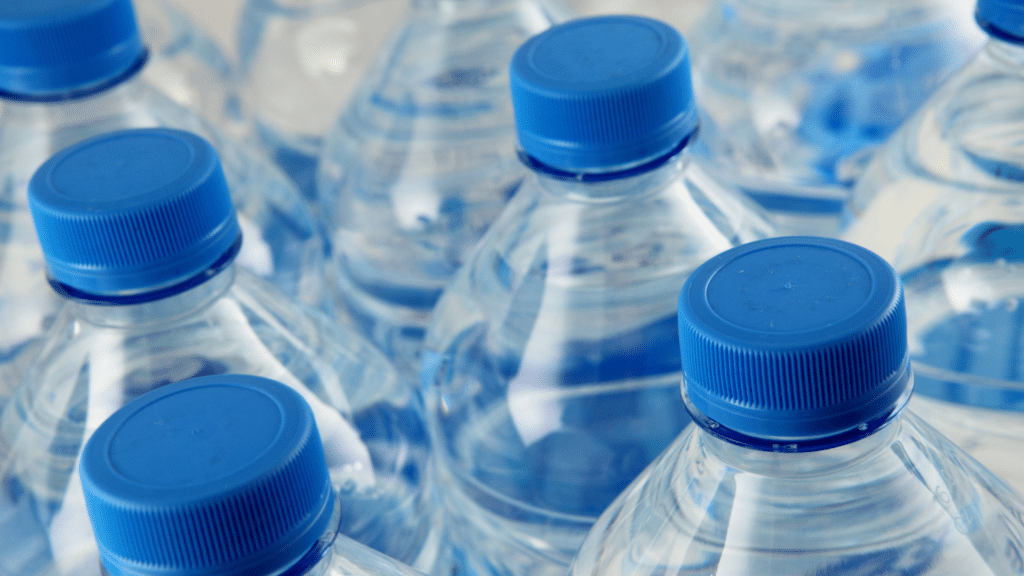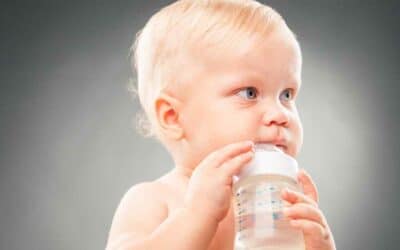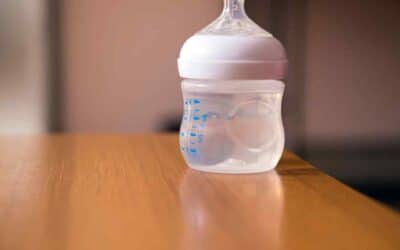As parents, we strive to provide the best care and nourishment for our babies, and one crucial aspect of their well-being is the quality of the water they consume.
Water plays a vital role in a baby’s development and overall health, making it essential for parents to understand the different types of water available and their potential impact on their little ones.
In this article, we will delve into the world of distilled water for babies, exploring its benefits, considerations, and essential information that every parent should know.

What is Distilled Water
Distilled water is a type of purified drinking water that has undergone a specific process called distillation, which effectively removes impurities and minerals, resulting in water that is free from contaminants.
Distilled water is produced through a process called distillation. Distillation involves boiling water and collecting the steam, which condenses into liquid form. This process separates the water from impurities, such as bacteria, viruses, heavy metals, and dissolved salts, resulting in pure drinking distilled water.
Removal of Impurities and Minerals From Water
During the distillation process, impurities and minerals are removed from the water. As the water boils, contaminants with higher boiling points are left behind, while the steam, mostly pure water, rises and is collected. When the steam condenses back into liquid form, the resulting distilled water is free from the impurities and minerals present in the original water source.
Is Distilled Water Safe for Babies?
Distilled water is considered safe for babies to drink and can also be used for mixing water for baby formula. However, concerns about potential mineral deficiencies may arise from using distilled water for babies.
Addressing Concerns About Mineral Deficiencies
Distilled water lacks essential minerals such as calcium, magnesium, and potassium necessary for infants’ growth and development. These minerals can be obtained through baby formula or nursery water instead of distilled water. Nursery water is the preferred choice because it is designed for infants and fortified with essential minerals.
The Role of Minerals in a Baby’s Diet
Minerals play a crucial role in a baby’s diet, as they contribute to the development of strong bones, teeth, and muscles and support proper nerve function and overall growth. While babies drink distilled water free from contaminants, it also lacks these essential minerals. Therefore, ensuring that your baby receives adequate mineral intake from other sources, such as breast milk, infant formula, or fortified baby foods, is important.
Expert Opinions and Research on Using Distilled Water for Babies
Experts generally agree that distilled water is safe for babies to drink and can be used for mixing water for baby formula. However, it is important to consider the potential mineral deficiencies resulting from distilled water and ensure your baby receives essential minerals from other sources. Consulting with pediatricians or healthcare professionals is crucial in making an informed decision, considering your baby’s needs and health status.

Benefits of Distilled Water for Babies
Here are some benefits of distilled water for babies:
Minimizing Exposure to Harmful Substances
Distillation eliminates harmful substances, such as lead, arsenic, and nitrates, which can be detrimental to a baby’s health. By using distilled water for babies, parents can minimize their child’s exposure to these harmful substances and reduce the risk of potential health issues.
Easier Digestion for Babies
Distilled water is free from impurities and minerals, making it easier for babies to digest. This can be particularly beneficial for infants with sensitive digestive systems or those who may have difficulty tolerating tap water or other types of water.
Lower Incidence of Certain Health Issues
Using distilled water for babies can help lower the risk of certain health issues, such as gastrointestinal problems or dental fluorosis caused by excessive fluoride intake. By providing a pure and clean source of water, parents can help ensure their baby’s overall health and well-being.
When and How to Use Distilled Water for Babies
It is essential to consult with pediatricians or healthcare professionals before using distilled water for babies. They can provide personalized recommendations based on your baby’s needs, age, and health status. Generally, distilled water is considered safe for babies to drink and can be used to prepare infant formula.

When preparing infant formula with distilled water, follow these steps:
- Ensure your hands, the bottle, and other equipment are clean and sterilized.
- Check the powdered formula’s packaging for the correct water-to-formula ratio and follow the instructions.
- Pour the required amount of bottled distilled water into the bottle.
- Add the appropriate amount of formula powder to the water.
- Secure the bottle’s lid and shake it well to thoroughly mix infant formula and water.
Distilled water can also be used for mixing baby food or cereals. To do so, follow these steps:
- Measure the required amount of baby cereal or food according to the instructions on the packaging.
- Add the recommended amount of distilled water to the cereal or food.
- Mix the water, cereal, or food thoroughly until smooth and lumps-free.
Potential Drawbacks and Considerations
While distilled water may be safe for occasional use or specific purposes, there are some potential drawbacks and considerations to keep in mind:
Potential Mineral Deficiencies and Their Management
One potential drawback of using distilled water for babies is the lack of essential minerals, such as calcium, magnesium, and potassium. To manage this issue, ensure that your baby receives adequate mineral intake from other sources, such as breast milk, infant formula, or fortified baby foods. In some cases, using nursery water, specifically designed for infants and fortified with essential minerals, may be a more suitable option.

Cost and Accessibility of Distilled Water
Distilled water can be more expensive and less readily available than tap water or other types of water. This may pose challenges for some families, especially those with limited budgets or restricted access to stores that sell distilled water. In such cases, using filtered tap water or purified water may be more cost-effective and accessible alternatives.
Balancing Distilled Water With Other Water Sources
While distilled water offers a high level of purity, it is important to balance its use with other sources that provide essential minerals for your baby’s growth and development. This may include using a combination of distilled water, cold tap water, filtered water, or fluoridated water, depending on your baby’s individual needs and the recommendations of a healthcare professional.
Consulting a Healthcare Professional for Individualized Advice
Before using distilled water for your baby, it is crucial to consult with a pediatrician or healthcare professional for personalized advice and recommendations. They can help you assess your baby’s specific needs, considering factors such as age, health status, and dietary requirements, and provide guidance on the appropriate use of distilled water combined with other water sources. Additionally, they can advise whether to boil distilled water before use or if it can be used as is.
Tips for Choosing and Storing Distilled Water
If you choose to use distilled water for specific purposes, such as medical or household uses, or for preparing powdered formula for babies, here are some tips for choosing and storing distilled water:

Selecting Reputable Brands or Producing Distilled Water at Home
1. Reputable brands: When purchasing bottled water, choose well-known and reputable brands that adhere to strict quality standards and provide clear information about their water purification process.
2. Check labels: Ensure that the label on the water bottle specifically states that the water is distilled, as other types of purified water, such as spring water or filtered water, may not offer the same level of purity for drinking water.
3. Home distillation: If you prefer to produce distilled water at home, consider investing in a high-quality water distiller. This will allow you to have a consistent supply of distilled water while ensuring its purity and safety.
Proper Storage Techniques to Maintain Purity
1. Store in a cool, dark place: Store distilled water in a cool, dark location, away from direct sunlight and heat sources, to prevent any potential growth of microorganisms or chemical reactions.
2. Use clean, airtight containers: If transferring distilled water to another container, ensure that the container is clean, airtight, and made of food-grade materials to maintain the water’s purity.
3. Avoid contamination: Always use clean hands and utensils when handling distilled water to prevent contamination. Additionally, do not touch the inside of the container or the water directly.
Understanding Expiration Dates and Shelf Life
1. Expiration dates: While distilled water does not technically expire, some manufacturers may include an expiration date on the packaging to indicate the recommended period for optimal quality.
2. Shelf life: Unopened bottles of distilled water can typically be stored indefinitely, as long as they are kept in proper storage conditions. However, once opened, it is best to consume the water within a reasonable time frame to ensure its freshness and purity.
3. Changes in taste and odor: If you notice any changes in the taste or odor of the distilled water, it may be best to discard it and replace it with a fresh supply.

Distilled Water Versus Boiled Water: Choosing the Right Option for Your Baby
In addition to distilled water, another option that parents often consider for providing safe drinking water for their babies is boiled water. Boiled water is water that has been heated to its boiling point and simmered for several minutes to kill potential contaminants, such as bacteria and viruses. Both distilled water and boiled water have their advantages, but there are some differences to consider.
Advantages of Boiled Water for Babies
- Kills Bacteria and Viruses: Boiling water is an effective way to eliminate harmful bacteria and viruses that may be present in tap water. Boiling water for at least one minute can effectively eliminate potential pathogens, making it safer for your baby to drink.
- Retains Essential Minerals: Unlike distilled water, which lacks essential minerals, boiled water retains minerals, such as calcium, magnesium, and potassium, which are vital for a baby’s growth and development. This can be an important consideration, especially for babies who rely on water as a primary source of minerals.
- Cost-effective and Accessible: Boiled water is more cost-effective and accessible than distilled water, as it can be easily prepared using tap water and a stove or an electric kettle.
Comparing Distilled and Boiled Water for Babies
- Purity: Distilled water is purer than boiled water, as distillation effectively removes not only bacteria and viruses but also other contaminants like heavy metals and dissolved salts. Boiled water can kill bacteria and viruses but may still contain other impurities.
- Mineral Content: While distilled water lacks essential minerals, boiled water retains them, making it a suitable option for parents who want their babies to receive minerals from water sources.
- Taste: Some parents may find that distilled water has a flat or tasteless quality to it, due to the absence of minerals. Boiled water, on the other hand, retains its minerals and has a more palatable taste.
Making an Informed Choice: Distilled Water or Boiled Water for Babies
When deciding between distilled water and boiled water for your baby, it is essential to weigh their respective pros and cons and to consult with a pediatrician or healthcare professional for personalized advice. Some factors to consider when making your decision include:
- The age and specific needs of your baby
- The quality of your tap water and potential contaminants
- The importance of mineral intake from water sources
- The cost and accessibility of distilled water compared to tap water
Ultimately, both distilled water and boiled water can be safe options for babies, but it’s crucial to ensure that the water is free from potential contaminants and that your baby receives adequate mineral intake from their diet. Making an informed choice based on your baby’s individual needs and the guidance of a healthcare professional will help ensure their health and well-being.

How to Keep Your Baby Hydrated
Typically, you must give your child access to drinking plain water to keep them hydrated. However, there are times when kids tend to act out, making it challenging to keep them adequately hydrated even with their favorite baby drinks. So, if you find encouraging your baby to drink water difficult, here are a few tips you can consider.
Frequent Sips are Advisable
Besides a dilute formula of cow’s milk, one effective way to let them stay hydrated is to offer small amounts of water throughout the day. You don’t need to ask them to drink 8 ounces of bottled water at once. Even a few sips from their sippy cup can already help. Meanwhile, if you want to try out diluted fruit juice, it’s highly advisable to limit their intake to 4 ounces daily, especially if you’re transitioning from breast milk or formula.
Capture Their Attention
Another way to encourage your child to drink baby water is by capturing their interest with creativity. You can make the entire process fun by introducing them to various shapes and colors. Consider using colorful straws or cups shaped like their favorite cartoon characters to get them excited.
Consider Their Activities
Children don’t have the same capability to regulate their body temperature as adults. So it’ll be much more challenging for them to cool off, especially when exposed to the hot weather or strenuous activities.
It’s essential to keep them hydrated before and after each activity. It’s best to encourage them to drink fluids during exercise. As a general rule, letting babies drink the water of 4 ounces every 20 minutes is a must. It’s a general rule to give them all the hydration without water intoxication.
Introduce Liquid Foods
Besides encouraging your child to eat solids, you can also start introducing your kids to water-rich foods after one year of age as you transition from breast milk or formula. It can be as simple as juices from undiluted fruit juice such as apples, grapes, oranges. You can also consider giving them flavor water or naturally sweetened drinks from lemon or cucumber! It’s an excellent choice if you want to let babies drink water independently.

Telltale Signs of Infant Dehydration
It’s only standard for a parent to get worried about their baby, especially if they notice signs of dehydration. So, here are a few symptoms of infant dehydration to serve as a guide. If you see any of these signs, it’s best to get in touch with your pediatrician.
- Fewer diaper changes compared to previous days/ lack of wet diapers
- Showing increased signs of exhaustion
- Sunken fontanelle, or the soft spot located on the infant’s head
- Dry mouth
- There aren’t any tears when the baby is crying
Understanding The Water Distillation Process
One common type of purified water that often surfaces in discussions is distilled water. Whether it’s for preparing baby formula, drinking, or even filling the iron, most parents prefer distilled water for its purity. This column aims to provide a comprehensive understanding of the water distillation process and its implications for our daily lives.
Implications for Drinking Water
One of the most common uses of distilled water is for drinking. Because it’s free from most impurities, many people prefer to use it in areas where municipal water supplies may not be reliable, or for those who prefer not to drink fluoridated water, common in many tap water supplies.
While small amounts of fluoride are beneficial for preventing cavities, particularly in permanent teeth, extreme cases can lead to fluorosis. Many experts often advise pregnant women, babies, and other vulnerable populations to limit their fluoride intake, and choosing distilled water can be one way to do that.
Role in Baby Formula Preparation
Many experts often recommend distilled water for preparing baby formula. Its high level of purity ensures that babies, who are particularly sensitive to contaminants, are given clean water.
However, it’s worth noting that distilled water lacks the extra minerals found in other types of water. While this isn’t an issue for adults, who get these minerals from solid food, it can be a point to consider for babies. The baby formula must provide these necessary minerals, given the role they play in a baby’s growth and development.
Other Uses of Distilled Water
Apart from drinking and baby formula preparation, distilled water is also ideal for use in certain household appliances like water softeners, steam irons, and humidifiers. The lack of minerals prevents build-up that can damage these devices over time.
Different Types of Bottled Water For Babies
In our previous column, we explored the benefits of mineral water for babies and discussed the importance of choosing the right type of water for your little one. As a natural progression, let’s delve into the various types of bottled water available and how they differ from one another. This column, titled “Different Types of Bottled Water for Babies,” will provide an overview to help you make an informed decision when selecting water for your baby.
Tap water
While tap water is readily available and regulated by municipal water supply systems, it may not always be the best option for young infants. Boiling tap water or using a home water filter can improve its safety, especially for babies under six months of age. As your baby grows, tap water can be a suitable and cost-effective choice as long as it meets safety standards.
Spring Water
Spring water flows naturally from an underground source and is bottled at the source. It contains various minerals that are beneficial to the human body. Spring water can be a good option for babies, as it retains its natural mineral content. However, always check the label for information on the source, treatment process, and the million total dissolved solids (TDS) to ensure the water’s safety and suitability for your baby.
Distilled Water
Distilled water is produced by boiling water and collecting steam, which leaves behind impurities. This process results in water with a higher boiling point and a lower mineral content. While distilled water is safe for babies, it lacks the essential minerals found in spring and mineral water, making it a less ideal choice as a regular source of drinking water for your little one.
Reverse Osmosis Water
Reverse osmosis (RO) water undergoes a purification process that removes contaminants by forcing water through a semipermeable membrane. While RO water is often referred to as “filtered water,” it’s important to note that this process also removes many beneficial minerals. As a result, RO water might not be the best choice for babies as their primary drinking water source.
Sparkling Water
Sparkling water is carbonated, either naturally or artificially, by dissolving carbon dioxide into the water under pressure. Due to its carbonation, sparkling water can cause gas and discomfort in babies, making it an unsuitable choice for their consumption.
Conclusion
Distilled water for babies is a topic that requires careful consideration and informed decision-making by parents. While distilled water is generally safe for babies to drink and can be used for mixing infant formula, it is crucial to address potential mineral deficiencies that may arise from its use.
Distilled water lacks essential minerals, such as calcium, magnesium, and potassium, which are necessary for a baby’s growth and development. Therefore, it is important to ensure that babies receive adequate mineral intake from other sources, such as baby formula or fortified nursery water.
Consulting with pediatricians or healthcare professionals is essential in making an informed decision about using distilled water for babies. They can provide personalized recommendations based on the baby’s specific needs, age, and health status.
Expert opinions generally agree that distilled water is safe for babies, but it is important to consider the potential drawbacks, such as the lack of essential minerals and the cost and accessibility of distilled water.
While distilled water offers purity by removing impurities and contaminants, it is crucial to balance its use with other water sources that provide essential minerals. Using a combination of distilled water, tap water, filtered water, or purified water may be necessary to meet a baby’s mineral requirements. Reputable brands should be chosen when purchasing distilled water, and proper storage techniques should be followed to maintain its purity.
Did this article help you? Please let me know if you have any questions!



